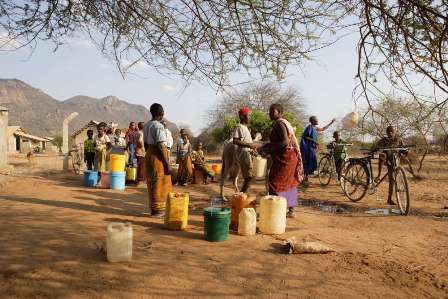Institutions and projects provide support services. Relentlessly focussing organisational energy on delivering help to actors in the field is paramount – for they are the ones who implement and empower real and lasting change.
Relentlessly focus on helping local people and institutions
Changing practices on the ground requires farmer-to-farmer, woman-to-woman, teacher-to-teacher exchanges intended to share hands-on practices and lessons learned, and develop self-help initiatives. These exchanges take place on many scales, from local to international.
Up-to-date knowledge and information provided by technical experts needs to be twinned with local/traditional knowledge, and translated into understandable messages and modules. Substantial resources are needed to develop and disseminate these materials and maintain educational networks.
By developing local, national, and regional capacity and skills, a project is more likely to leave a lasting legacy.
Projects: Basim, Huong River Basin, Pangani River, Tacana Project, Volta River Basin
Stories from the field:
- El Salvador: Rio-C-Mas and Groups – IUCN helps a women’s cooperative that makes jewelry out of seeds buy equipment and plant more trees, helping reforestation efforts.
- Tai-Baan empowerment of the Songkhram –Tai baan (villager-led) research builds community expertise to document changes to their environment caused by development projects. IUCN sponsored tai baan research in Thailand sparked a village conservation movement that included restraints on fishing and harvesting forest products.
- Giving voices to a transnational river ‘mouth’ – IUCN helps villagers write a ‘water charter’ to establish rights to notification about when dam releases will occur along the Senegal River. Without notification, their farms were threatened.
- A story of rights and conflicts – Climate change exacerbates problems of overextraction, overfishing, and pollution. Tanzania’s National Water Policy devolves the authority of water allocations to the basin-level, where conflicts can be best addressed.
- Trust among Nigerian states – It takes an outside consultant two years, but he gradually builds trust among Nigerian states and factions to cooperate on managing a river basin.
Related WANI Toolkits:
FLOW: Chapter 3 - Modifying Water Infrastructure, Chapter 4 - Creating a Policy and Legal Framework, Chapter 6 - Generating Political Momentum, Chapter 7 - Building Capacity for Design and Implementation
NEGOTIATE: all chapters
PAY: Chapter 4 - Roadmap towards Agreement, Chapter 5 - Rules at Work
RULE: all chapters
SHARE: Chapter 2 - Why Share? The Benefits (and Costs) of Transboundary Water Management
VALUE: Chapter 1 - Putting ecosystems into Water Equations, Chapter 3 - Valuing Ecosystems as Water Infrastructure, Chapter 4 - Using Ecosystems Values in Water Decisions
